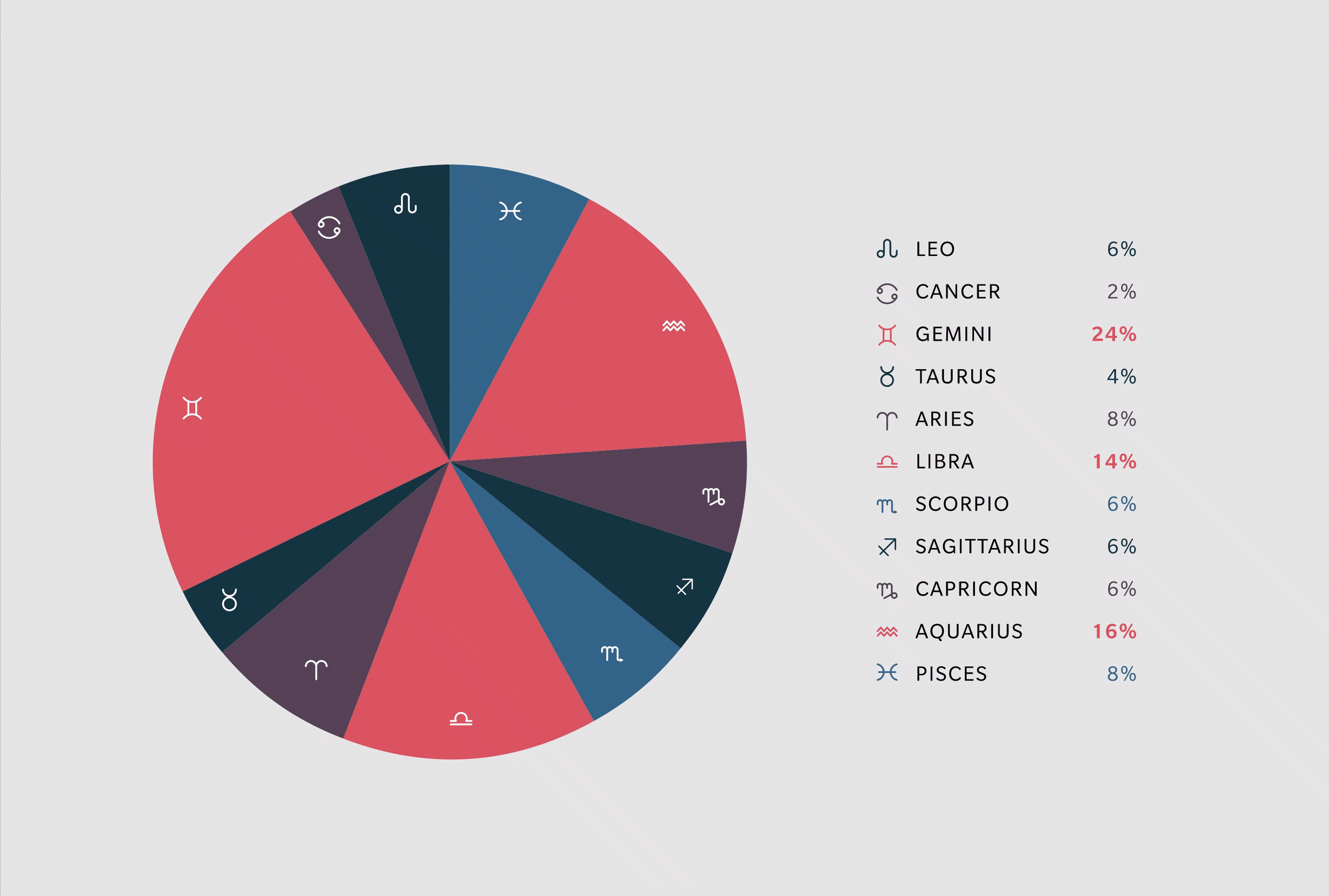Do Air Signs Really Have the Longest Life Spans?

The cerebral-based air signs (Gemini, Libra, Aquarius) make up more than half of the living supercentenarian population, a fascinating correlation between (supposed) even-tempered principles and lifelong endurance.
A few months back, in the wee hours dedicated to witches and insomniacs, I found myself once again drowning in the quicksand of the proverbial internet rabbit hole, shelving my workload to peruse the 15 open tabs of various Wikipedia pages my curiosity refused to abandon. What started out as an innocent search for "black widow First Lady" (President Harding's wife allegedly poisoned him) somehow forged a path to a page on supercentenarians (i.e., a person who has reached the age of 110). Completely entranced, I started poking around the web to find out just how rare it is to traverse 11 decades.
Turns out, as L. Stephen Coles, a biochemistry lecturer and cofounder of the Gerontology Research Group, told Smithsonian Magazine, the odds are about 1 in 7 million.
Fake old fogies
About 98 percent of ages reported to be older than 115 are false claims, according to Thomas Perls, a geriatrics professor and director of the New England Centenarian Study. Those who boast a life span lasting past a century and a decade must come correct with proof beyond anecdotal evidence.
Coles requires documentation of their birth, a current government-issued ID and a paper trail that verifies any potential name changes, such as after marriage—after all, women are 10 times more likely to reach this milestone than their male counterparts. Gender aside, what sets these supercentenarians apart from those who don't live past the double digits?
"I've interviewed more supercentenarians than probably anyone else, trying to find out what they have in common, [and] the answer is almost nothing," Coles told Smithsonian Magazine with matter-of-fact certainty.
Sign(s) of old age
Being a meticulous Virgo sun, I've always found a deep sense of pleasure in finite calculations, compartmentalization and the overwhelming usefulness of lists, charts and spreadsheets. I've always been acutely aware of how my mind is particularly drawn to dates, especially birth dates. This served a greater purpose when I began studying astrology many moons ago, tabulating birthdays and separating them by sun sign. The discernible Virgo in me loves to find patterns in practically anything in my mind, so when I stumbled upon the list of the oldest living people, neatly categorized by date of birth, my eyes lit up.
As I scanned the list, Cole's "almost nothing" quickly formed into "positively something" through my lens, albeit unworthy to the scientific community. I noticed a trend in repeating birth months throughout the list of the 50 oldest living humans—it's hard to miss a cluster of five June birthdays in a row.
As I went down line by line, it was glaringly obvious February, June and October appear the most, occupying so many rows I couldn't help but do a head count. The signs of the zodiac typically change around the 20th to the 22nd of any given month, but those dates also vary year to year, so I made a point of double-checking any supercentenarian whose birthday falls during those indiscriminate cusp dates by plugging their birth information into a natal chart calculator.
Here is a sign-by-sign breakdown of the 50 oldest supercentenarians currently alive:

The chart above is divided into four colors, representing the four elements in astrology, which have three signs each. Virgo is not included in the pie chart since there are no living supercentenarians with their sun in the sign. Is this because Virgo is thought to be a perfectionist to a fault and self-critical? I won't say no.
The remaining two earth signs in green (Taurus, Capricorn) equate to 10 percent of the total population. The water signs in dark blue (Cancer, Scorpio, Pisces) make up 16 percent, while the red fire signs (Aries, Leo, Sagittarius) consist of 20 percent of the total. The periwinkle air signs (Gemini, Libra, Aquarius) account for a staggering 54 percent, which means more than half of the supercentenarian population is made up of one-quarter of the zodiac, with a full quarter going to the curious, Mercury-ruled Gemini alone.
Regardless of whether or not you "believe" in astrology or consider it total hogwash, it's a clear pattern—or at the very least, an impressive coincidence.
Reason or random?
In May 2021, scientists conducted a whole-genome sequencing analysis of 81 Italian semi-supercentenarians and supercentenarians, with a control group of 36 elderly individuals from the same region who hadn't reached the coveted three-digit century mark, searching for genotype indicators that could be attributed to longevity. Genealogy experts Perls and Coles believe there's really no rhyme or reason to explain why some people live considerably longer than others, reporting some supercentenarians quite happily drink and smoke, some experience traumatic life events and health issues, and others cruise through life as stress-free as possible.
According to 115-year-old Thelma Sutcliffe, the oldest living person in the United States (born October 1, 1906), the key to longevity is practicing a worry-free lifestyle. Spoiler alert: This is a pretty big air sign trait, which tracks as Sutcliffe is a Libra. The world's second-oldest person, Lucille Randon (born February 11, 1904, an Aquarius), is the world's oldest COVID-19 survivor on record, confidently trudging through the illness with, according to her account, no fear.
To those who understand the fundamental basics of astrological elements and their traits, it's easy to connect the dots between air signs and longevity. Considered the most intellectual, philosophical, detached, inquisitive, communicative and logical, the three air signs prioritize cerebral stimulation and enriching experiences. They don't sweat the small stuff, and they're able to maintain a levelheaded mindset and cool disposition. In fact, some consider air signs to be cold and aloof, the least emotional signs of the zodiac.
Sure, the evidence for my theory is anecdotal. We simply don't have the data on whether certain personality traits increase your life span at all, let alone past age 110. Still, keeping a sharp mind can only benefit your chances of a lengthy life. Reading on a daily basis, completing brain puzzles like sudoku or crosswords, and fortifying your communication skills are wonderful deterrents of dementia and enliven the eldest of spirits. And if you happen to be a Gemini, Libra or Aquarius, give yourself a high five, because your chromosomes may come equipped with the cheat codes that enforce vitality.
Who knew?


















